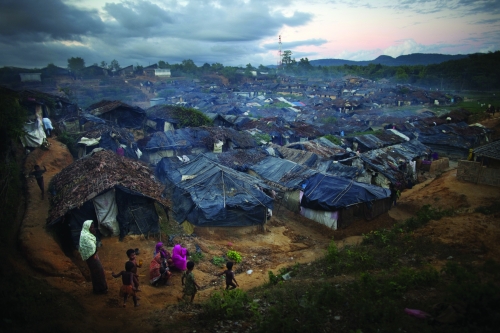
Many predominantly Buddhist countries in lower Asia are also home to substantial populations of Muslims. Likewise, a number of Muslim countries are home to Buddhist minorities. Majority-minority relations can be contentious, but add ethno-religious lines to the mix and things can easily degenerate from prejudicial policy-making to unbridled violence. (Take Rakhine Buddhist violence against the Rohingya Muslims in Burma, for example, which Tricycle covers in its most recent issue.)
Despite what unbalanced histories and historical mythologies might indicate, relations between the two faiths weren’t always so troubled. Buddhism and Islam encountered one another on the Silk Road and enjoyed a relationship that for the most part was not only peaceful, but also involved a cultural exchange that played a part in transforming both religions into their current manifestations. Such a history flies in the face of that of the common imagination, where a violent confrontation in which Muslims essentially terrorize the eminently serene, peace-loving Buddhists dominates. In recent decades, we’ve witnessed a very real reversal in which Buddhist-ruled governments engage in ethnic cleansing and attempt to relegate Islamic countrymen to permanent refugees in their own country, as has been the case in Burma and Sri Lanka.

The Khaleej Times reported the largest anti-Muslim rally to date in Sri Lanka last Sunday. Led by the Buddhist organization Bodu Bala Sena (“Buddhist Power Force”), members and supporters marched to petition for a ban on halal food certification and the building of mosques with funds from Middle-Eastern countries. The Khaleej Times quotes the BBS Secretary Galaboda Aththe Gnanasara Thero on the militant ambitions of the Buddhist group: “Hundreds of monks are ready to fight….Our country is a Sinhalese one and we are its unofficial police.” Buddhist clergy-led social action has proven itself a powerful catalyst for social change in lower Asia. These days, favored reform unfortunately seems to run along the lines of racism and militant nationalism.
In more benign, and certainly more baffling news, Buddha statues have joined the likes of Barbie dolls and Simpsons figures under a countrywide ban in Iran. Iranian authorities have been seizing Buddha statues from shops in Tehran in order to stymy the ongoing “cultural invasion.” While these sanctions generally focus on Western products, this might be “the first time that Iranian authorities are showing opposition to symbols from the East,” ABC News speculates.

In Tibet, a land where Buddhists and Muslims have coexisted peacefully since the 12th century (Buddhists frequent the Muslim restaurants for their halal meat, generally regarded as the most flavorful), a new religious player has entered the scene: Christianity and its missionaries. The Guardian reports an influx of evangelists pouring into Tibet, where they are selectively tolerated by the traditionally anti-proselytist Chinese establishment. The Chinese government likely welcomes these new missionaries because they offer “a powerful counterforce to Tibetan Buddhism, with its electrifying political overtones.” However, since Buddhism is so central the cultural identity of Tibetans, they are notoriously tough sells in the spiritual marketplace.
I leave you with a koan—and some love from Russia—to contemplate over the weekend: Regarding he who shakes in the manner of Harlem, is it the man that moves, the meme, or the mind?
Thank you for subscribing to Tricycle! As a nonprofit, we depend on readers like you to keep Buddhist teachings and practices widely available.